With the growth of audience expectations and the increase in the number of new releases, the gaming industry is becoming one of the most competitive industries in the world of technology. Players today have too many choices – companies are forced to compete not only for sales, but also for the time that people are willing to spend on their product.
Only a professional approach to game development allows you to withstand competition and not get lost among thousands of companies. It begins with an analysis of the market landscape and the chosen niche, studying the current needs of the audience, clearly setting tasks and high-quality technical implementation of the project.
AVADA MEDIA team has been developing custom games for over 10 years, we have implemented dozens of game development projects. The company offers full-cycle service: we implement your ideas on a turnkey basis – from concept and design to game mechanics and code.
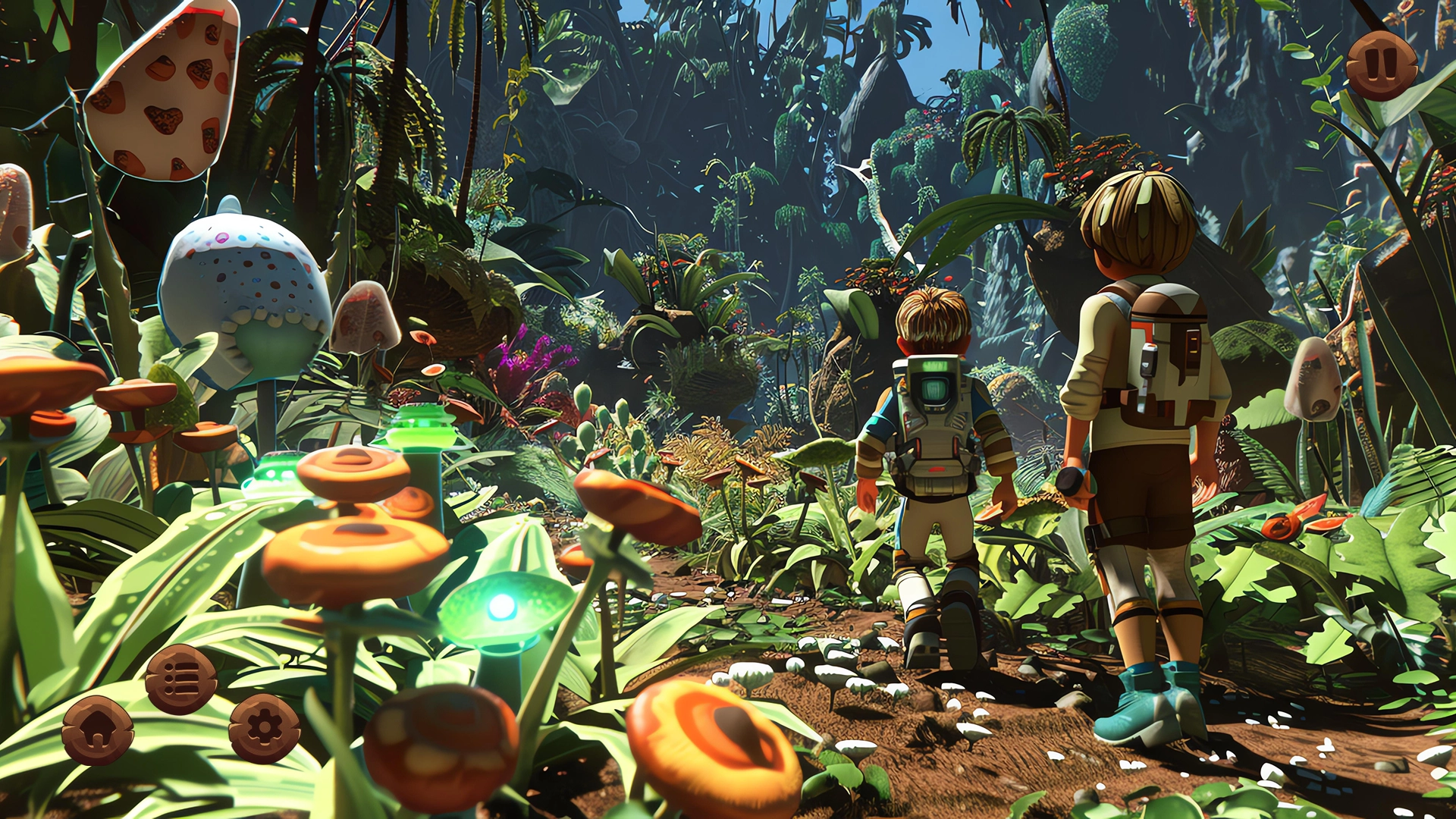
In order to successfully enter the market in the context of globalization and high industry saturation, a good idea alone is not enough – a high level of execution at each stage of development is required. The market is characterized by a high level of competition – on the one hand, large corporations with multi-million budgets and established franchises, on the other – talented indie developers actively developing niches.
The rapid development of technologies (AI, VR/AR, cloud gaming) opens up new niches and opportunities, but at the same time increases the requirements for product quality and speed of adaptation. The cross-platform struggle between products for mobile devices, PCs, consoles and cloud platforms is also intensifying.
In such conditions, the company’s ability to transform an idea into a competitive product that meets market requirements and user expectations is critically important. To achieve this goal, an individual approach to each project, careful elaboration of all stages of production and a high level of execution at each of them are necessary. These are the principles that the AVADA MEDIA team is guided by.
What do we mean by a professional approach to game development:
Development of goals and compilation of a game design document is the foundation of a successful game project. This helps to fix the goal and formulate the concept, ensuring effective planning, management and quality control in the development of custom games.
Only specialists with the appropriate qualifications and relevant experience can create a game that will be profitable, interesting to the target audience and technically stable. Selecting a team is a strategic investment, on which the result of game development and the success of its release depend.
The choice and combination of tools and technologies affect the performance, scalability and payback of the product, the pace and cost of game development services, the quality of gameplay and visuals. The adaptability of the project to different platforms and the ability to integrate monetization, analytics, third-party services also depend on the technical stack.
Time management, iterative work, prototyping and testing are critically important at the early stages of turnkey game development. These elements of work allow you to effectively manage risks, save resources and ensure a result that meets the expectations of the customer and the audience.
Feedback collection and testing are an integral part of game production. They allow you to test hypotheses and the viability of design solutions, identify bugs and weaknesses in gameplay, check UX, server stability, compatibility with various devices, etc. You can order turnkey game development in compliance with these conditions from AVADA MEDIA.
A responsible approach to testing a product before entering the market allows you to prepare for a successful release, prevent wasting resources on unnecessary functions and bad ideas, and improve the user experience.
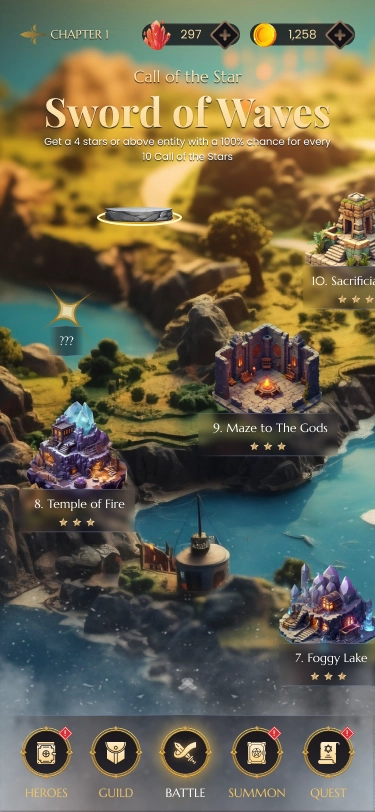
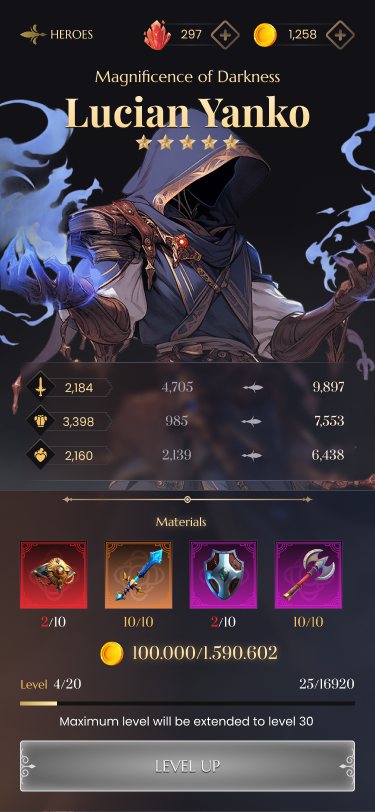
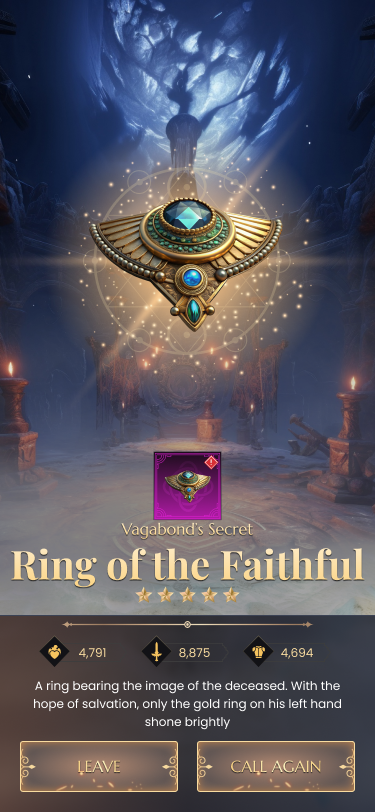
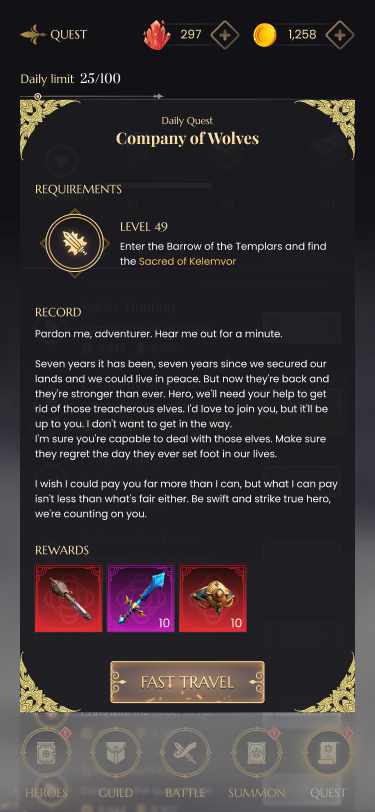
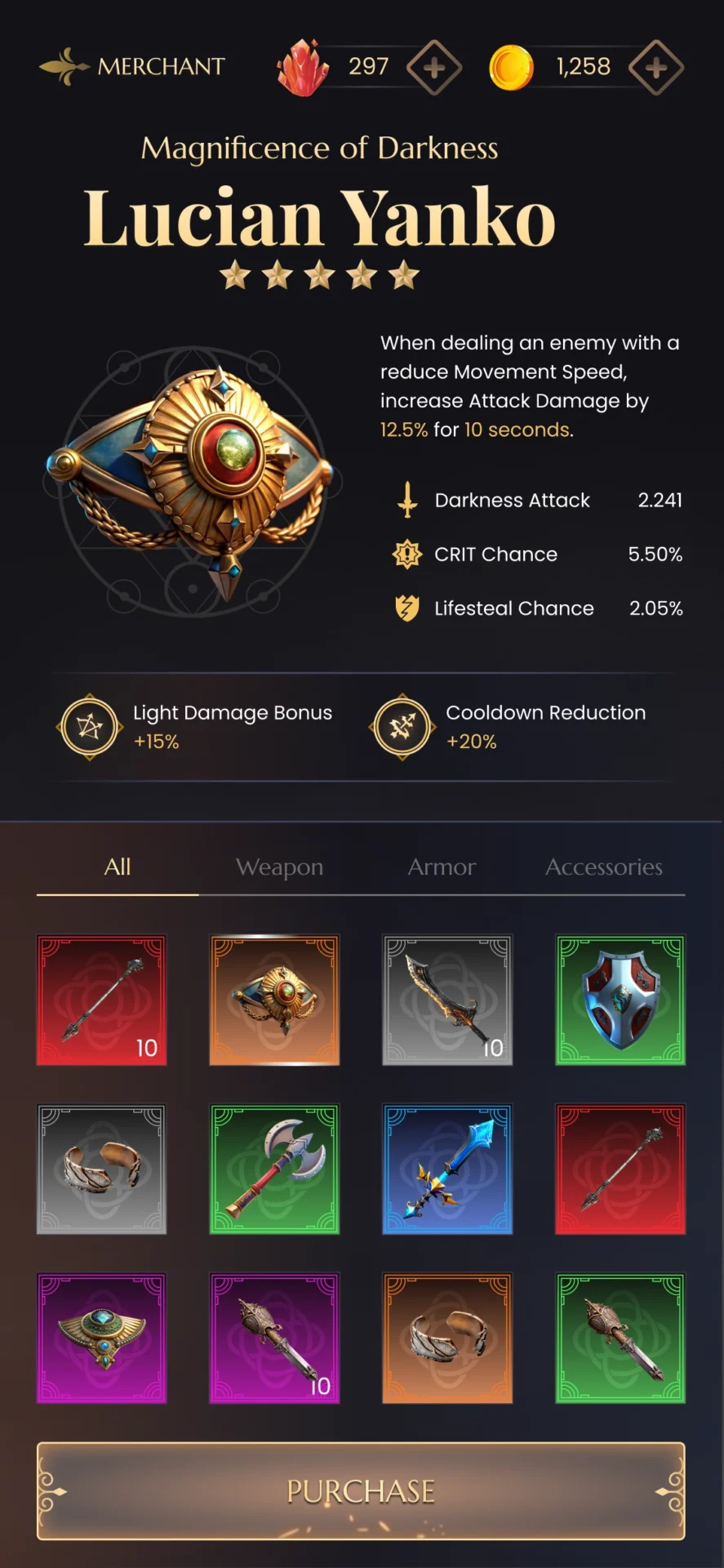
Puzzle RPG Mobile Game
A quality game is the result of a comprehensive approach at every stage of development. Here are 6 key aspects that influence how the audience will accept your product:
Users expect high-quality images, good color rendition, and high detail. At the same time, during the development of games and applications, it is important to optimize resource consumption so that the user’s device is not overloaded.
The components of success are exciting, original mechanics with gradually increasing complexity of tasks, a variety of interactions and activities (environment, enemies, artifacts, alternative solutions, bonus levels).
Analysis of the audience, understanding the market landscape and current trends allows you to ensure and maintain the interest of players during the game.
A user-friendly menu, easy access to important information, and a logical arrangement of buttons are important. When creating a game, it is important to maintain a balance between originality and simplicity.
Completing tasks should be interesting and feasible. Clearly developed rules and consistent logic help with this: so that the player can quickly navigate the laws of the universe, the principles of interaction with the environment and other participants. All actions must have a predictable, justified result.
Stable application operation and good user experience are incompatible with bugs and crashes. Well-thought-out game mechanics and technically competent implementation of each element, including clear controls and responsiveness, are necessary for success.
Alternative tasks, tactics and styles of play, additional enemies, abilities, hidden levels, mini-games and plot branches diversify the user experience and increase engagement.
There are many options to retain and increase player retention: new modes, achievements, goals, alternative endings, online competitions. You can order the development of a game with all these elements in different combinations from AVADA MEDIA.
Visual design, a unique world with authentic aesthetics and history, a well-developed plot and interesting characters help users immerse themselves in your universe. The complexity of tasks as the plot progresses, a well-thought-out arrangement of enemies and objects on the player’s path ensure an increase in interest.
Clearly defined tasks and a well-thought-out reward system (points, abilities, items, etc.) maintain excitement and give a sense of progress. AVADA MEDIA developers create games taking these rules into account.
Game interface examples
The process of creating custom games includes five major stages, each of which is divided into several stages and areas of work.
At the pre-production stage, key components of the future project are laid down, ensuring stability and predictability of game development by programmers and other specialists.
Preparatory work:
Pre-production allows you to avoid misunderstandings, delays and costly alterations, giving a high-quality start to the entire production cycle.
This is the main stage of game development, during which the concepts recorded in the design document, technical specifications and prototypes are embodied in a working product:
At this stage, all key specialists are involved: programmers, game designers, artists, animators, scriptwriters, testers. All elements are integrated into a single system, production is the basis for the material embodiment of the game.
The testing stage (Quality Assurance) is critically important in custom game development – it ensures the high quality of the final product:
The quality, stability, competitiveness and commercial success of the project depend on testing. Game refinement based on testing strengthens audience trust, supports the company’s image, and reduces post-release maintenance costs.
This is the culmination of game development – the release of the product to the market. This is a strategically important stage, on which the perception and success of the product depend:
After the release, a wide audience gets access to the product. This stage shows how the market, players, media, and publishers actually perceive the game, and how well the commercial and image goals were achieved.
The future and potential of the project – the feasibility and prospects of content updates, additions (DLS), activities, creation of sequels, and franchises – depend on how well the release is carried out.
In the conditions of high competition and rapidly changing user expectations, post-release technical support is the final, but no less important stage of the game life cycle. It ensures stable operation and development of the project after its release to the market:
Post-release technical support ensures technical stability, relevance and commercial success of the game in the long term.
Compliance with this sequence of actions when outsourcing game development allows AVADA MEDIA to create high-quality IT products without bugs and errors, deliver them within the agreed time frame, in accordance with the specified technical specifications and the client’s expectations.
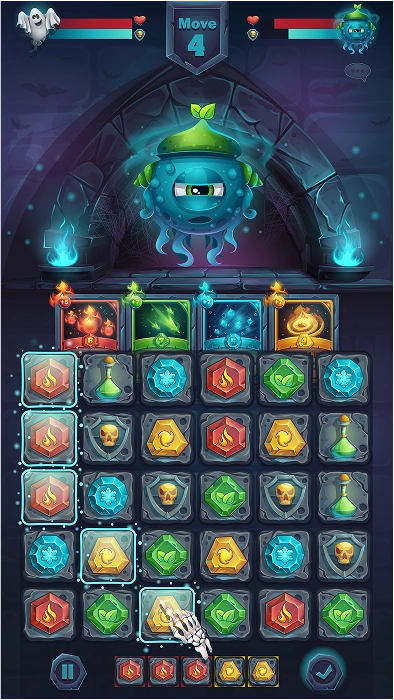
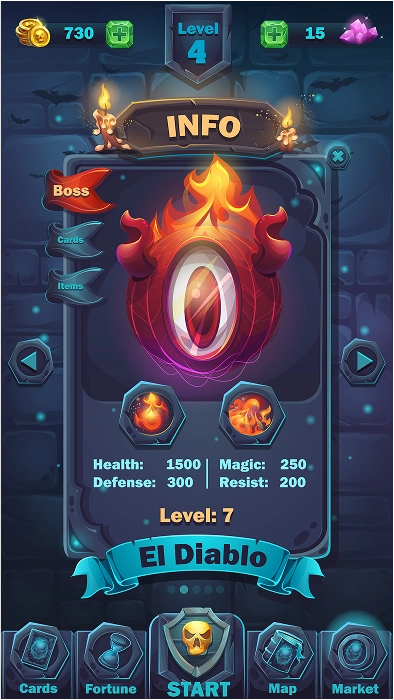
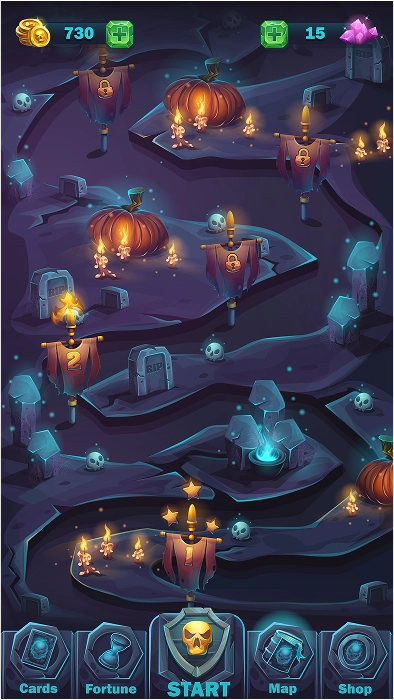
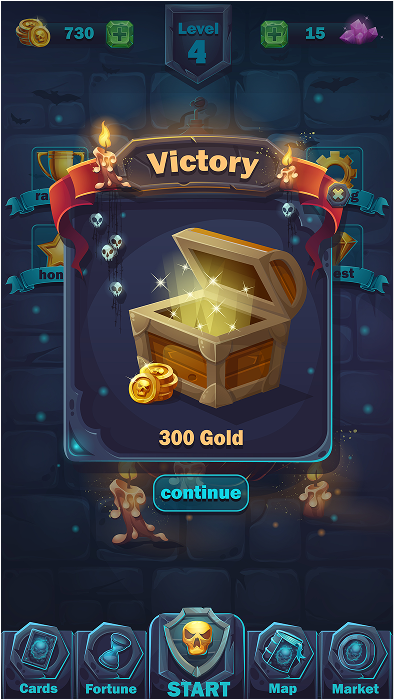
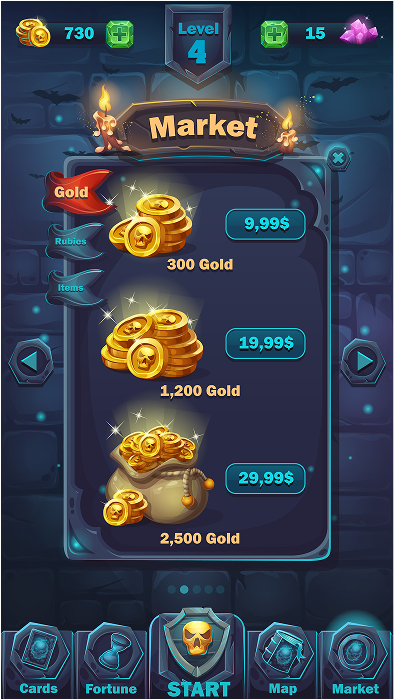
Mobile game interface examples
Creating a game from scratch is a multi-level process that requires a professional approach, strategic thinking and a deep understanding of the specifics of the gaming industry. AVADA MEDIA specialists offer comprehensive support for the development of IT products from idea to release with subsequent technical support.
What will be the algorithm of actions if you are interested in developing a turnkey game:
A flexible, step-by-step production cycle for turnkey game development and an iterative format of cooperation ensure prompt introduction of edits and changes without stopping the process.
A flexible interaction model combined with a team of experienced developers ensures high-quality results and their compliance with audience expectations. An AVADA MEDIA specialist will tell you how much it costs to create a game from scratch and how long it will take to complete your project – contact us.
To implement a game project, it is not always necessary to form a fully staffed team, including specialists of all profiles. Sometimes it is more effective to involve an external team on a project basis that meets the company’s goals and the scale of the plan.
In such cases, a team is formed that is adapted to the specific needs of the customer – with the involvement of specialists with the competencies necessary for the successful completion of the project.
Such strengthening of the customer’s internal staff allows you to optimize the production process and ensure timely preparation for the launch date and a successful entry into the market. To clarify the preliminary price of game development, we recommend contacting AVADA MEDIA specialists – after the consultation, an individual calculation will be prepared based on the goals and features of the project.
This approach allows us to specifically cover all project needs, speed up game production and minimize potential risks of missed deadlines without having to expand the company’s staff.
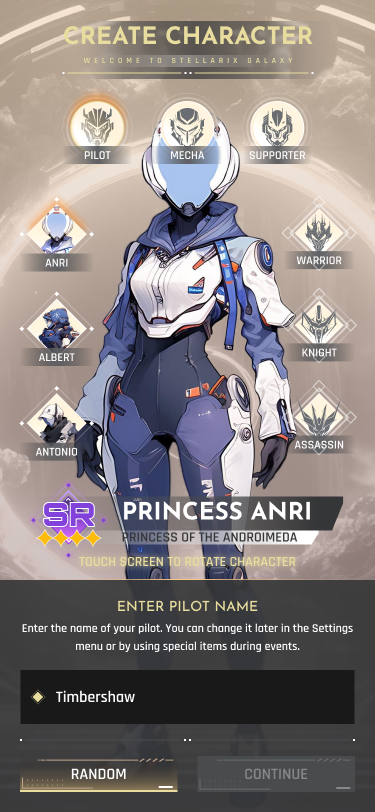

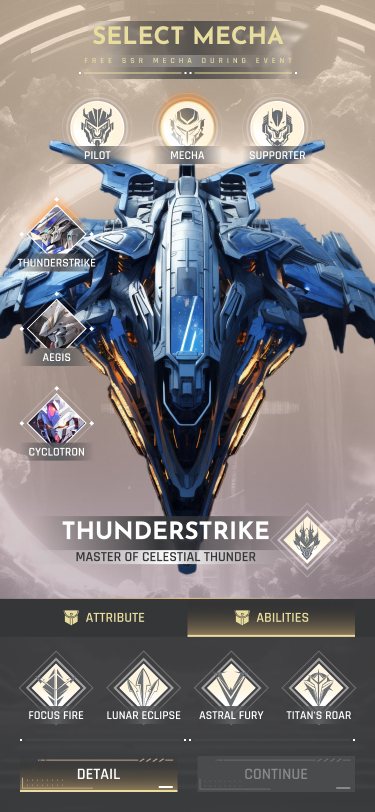
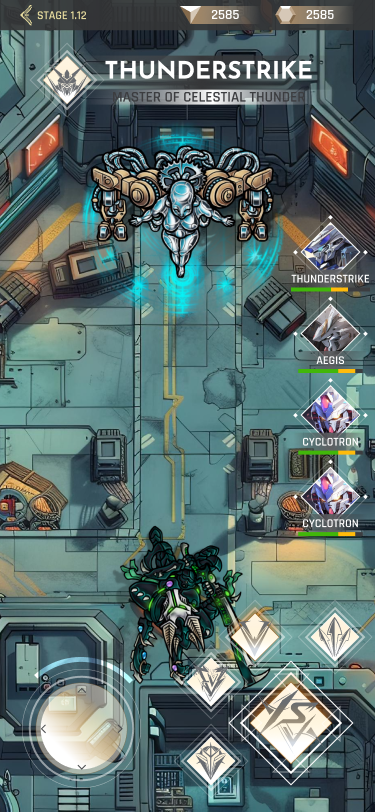
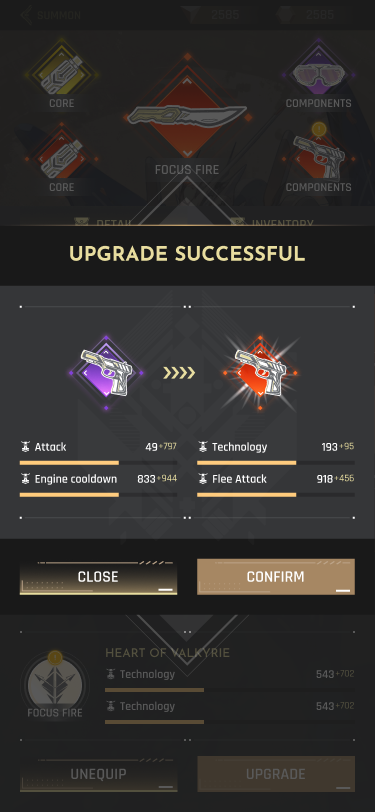
RPG Mobile Game
AVADA MEDIA team provides a full range of services for game development. Let’s take a closer look at them:
The goal of every customer and game developer is to create an exciting, intuitive, and engaging product. Game design is responsible for achieving these results. Game designers work on the plot, interface, logic of user interaction with the virtual universe of the project, mechanics, balance, and visual style.
Game design development takes into account the entertainment aspect, player psychology, possible behavior scenarios, and motivations. You can find out how to bring all these elements together, optimize gameplay, and increase the chances of commercial success for your title by contacting us here.
The success of a game project is impossible without competent planning. Developing technical specifications for mobile games ensures that the product meets the expectations of the target audience and the business goals of the customer. After an initial consultation, this document outlines the project’s goals, the results of competitive landscape research, target audience characteristics, functionality, mechanics, graphics, technology stack, and other aspects of development that affect the outcome.
You can read more about why game technical specifications are needed, as well as how they improve the quality of the final product and the transparency of cooperation, on this page.
2D character design – creating their visual images in two-dimensional space. The process involves working on proportions, silhouettes, clothing and accessories, color schemes, and facial expressions. We work in a variety of styles – from minimalist pixel art and various stylizations (e.g., painting) to realism with an emphasis on anatomy, lighting, and textures.
Here we explain how to make your characters not only distinctive and recognizable, but also an organic extension of the game’s narrative, revealing their personalities and motivations.
Three-dimensional characters are expressive thanks to their volume, which provides a deeper immersion for the user in the atmosphere and increases the aesthetic value of the product. 3D design allows you to achieve a high level of realism and detail, experiment with lighting and angles, which simplifies animation and further development.
3D character design is ordered for games, videos, films, advertising, VR/AR, and other digital projects. Learn more about how we create three-dimensional characters on this page.
Even the highest quality graphics without movement can look static and boring. Animation brings characters to life, adds dynamics to the gameplay, environment, and events, making the title truly exciting. Motion design helps convey nuances of emotion and character, visualize the motivations of characters and the features of the virtual universe as a whole, enhancing the effect of presence.
Dynamic graphics add depth to the project, allowing you to achieve a unique atmosphere, effectively engage and retain your audience, and increase the commercial value of the product. Read here about the types of game animation you can order and the stages of their creation by AVADA MEDIA studio specialists.
The main advantage of this engine is its cross-platform capability. Unity allows you to create a title that will immediately work on 25+ operating systems without the need to rewrite the code. The tool allows you to significantly expand your audience reach and accelerate your time to market. A large library of ready-made plugins, the use of C#, and a modular system for writing game projects reduce development costs. And built-in services for animation and optimization help achieve truly high product quality, increasing its commercial potential.
The solution is universal – Unity is used to create 2D and 3D games for mobile platforms, consoles, PCs, and browsers. Read here about the advantages of this engine in addition to high performance, multiplayer capabilities, and realistic graphics and physics.
Thanks to the flexibility of UE’s IT solutions and tools, this engine can be used to develop game projects of any genre and scale. It supports all popular platforms and allows for photorealistic graphics.
The tool is free to use until the game’s revenue exceeds $1 million. It also has a large community and numerous ready-made assets, and with the MetaHuman Creator cloud solution, realistic characters can be created in literally minutes. This significantly reduces development time and project costs. Read about other advantages of Unreal Engine in game development and beyond on this page.
Online titles are one of the most dynamic and promising segments of game development. Web solutions open up a wide range of genres and formats, from simple browser arcades to large-scale multiplayer projects. This area of the gaming industry allows you to quickly attract and retain an audience, forming a loyal community beyond geographical boundaries and device types.
Detailed information on how we implement online projects can be found here.
A stable connection and comfortable gameplay are integral attributes of high-quality online and multiplayer titles. A well-designed server architecture makes it possible to achieve this result. Without it, it would be impossible to hold mass competitions and e-sports tournaments. In addition, servers ensure the smooth operation of large-scale virtual worlds.
Investing in this area of game development improves the quality and capabilities of the product. This, in turn, increases audience loyalty, reduces the risk of technical problems, and contributes to the commercial success of the product. You can learn more about the types and tasks of game servers and the stages of their deployment by following the link.
Casual games are an effective way to quickly enter the market and win over a wide audience, ensuring high engagement and good monetization rates. Such projects are distinguished by simple rules, intuitive controls, and short gaming sessions, making them accessible to users from any device at a time convenient for them.
Casual titles are suitable for mobile platforms, social networks, advertising, and educational purposes. They are a universal solution for entertainment, business gamification, brand and service promotion, as well as interactive, including corporate, training. You can read more about the features, types, and stages of casual game development on this page.
Advertising game projects are an effective tool for promoting products, companies, and services. A distinctive feature of promotional games is the combination of entertainment and marketing: users get a vivid interactive experience of interacting with the brand, and the business gets the opportunity to convey its message and advertise its product range in a form that is interesting to the target audience, through channels that are convenient for them.
Adding a system of points, achievements, bonuses, and various ratings to such projects further increases user engagement and retention. Any genre can be used for gamification – from browser mini-arcades to impressive VR/AR titles. Detailed information about the possibilities of promo games and how we develop them can be found here.
Three-dimensional space, volumetric graphics, and realistic visualization open up great opportunities for creating detailed virtual worlds and vivid characters. These features of 3D games increase the level of immersion, engagement, and user retention. Action games, shooters, simulators, adventure projects, and RPGs – modern technologies allow for the implementation of complex mechanics and animation, making the gameplay rich and unique.
3D titles are created for PCs, mobile devices, consoles, and VR platforms, allowing them to reach a wide audience and provide an exciting gaming experience and emotional engagement. Read more about how we develop 3D games, what technologies we use, and what determines the price on this page.
This is an innovative segment of game development. In these games, in-game assets and currency are built on blockchain technology, which ensures the security and transparency of the game economy and full ownership of digital assets. In blockchain titles, users buy, sell, and exchange unique tokens (NFTs), with the opportunity to earn real income from the game.
There are many options for crypto and blockchain games – from collectible card applications and strategies to metaverses. Such projects attract a solvent audience, allow you to expand monetization models through cryptocurrencies and NFT trading, and increase audience loyalty. You can read more about the features and benefits of developing crypto games on blockchain by following the link.
Easy access, instant launch, and integration with the messenger’s social features – game projects for Telegram provide fast market entry and wide reach. These can be mini-apps or game bots in various genres (from casual clickers, puzzles, and quizzes to multiplayer titles with elements of strategy and RPG).
Thanks to Telegram’s built-in notifications, such projects effectively attract and retain an audience and are used as entertainment, a promotion tool, and gamification. Read here about how we develop games in Telegram and what advantages they offer, in addition to access to a million-strong audience and the ability to collect analytics in real time.
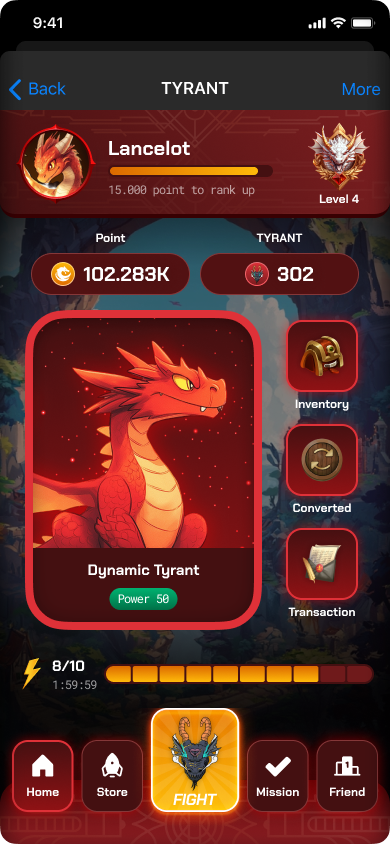
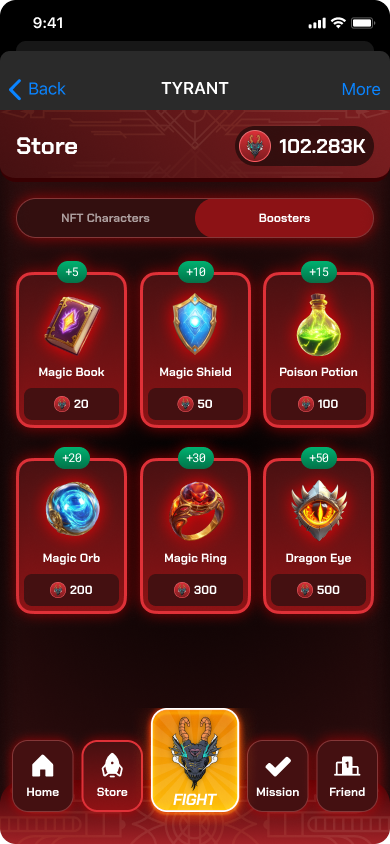
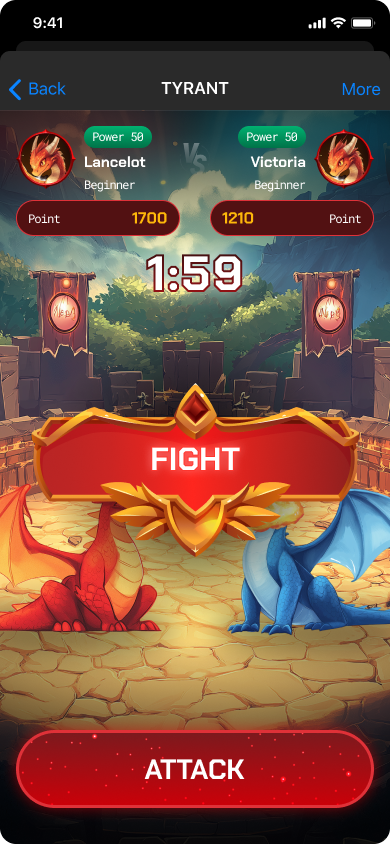
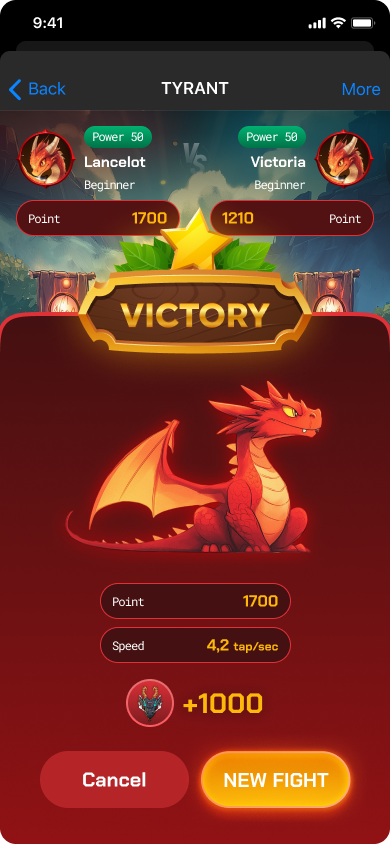
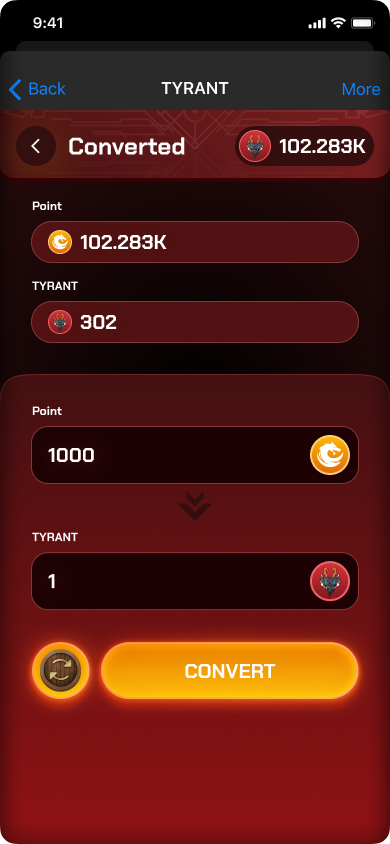
Telegram game
The first stage of game production is preparatory: a detailed discussion of the key parameters of the project: concept and idea, expectations, business goals, budget, implementation deadlines and production schedule.
The discussion clarifies the main aspects:
Preliminary development of these aspects allows you to lay the foundation for subsequent stages of production and ensure that the product meets the expectations of the customer, the target audience and the market situation. Preliminary estimates of the cost of game development services are made. It depends on the chosen genre and complexity, deadline expectations, technology stack, required number and skill level of specialists. This could be a game designer, programmer, 2D/3D artist, animator, tester, producer or manager.
As a rule, we provide a preliminary cost of game development for the project within a week after the first consultation.
After agreeing on the key parameters of the project, it is necessary to formalize the cooperation:
These steps ensure transparency of cooperation, efficiency of project management and measurability of results.
Before production and programming, the following are compiled and agreed upon:
The stage of preparation for game production takes on average 1-2 months, depending on the complexity of the project.
Having a clear understanding of the concept and visual and plot style of the project, the AVADA MEDIA game development studio determines a list of key elements required to create a minimum viable product (MVP) necessary for a soft launch. This is a limited version release that includes basic gameplay, a scenario base, or the first level of the game with limited access. The goal is to test game mechanics, plot elements, stylistic design, and also collect initial feedback from the target audience to refine individual elements if necessary. Based on the analysis of data on labor costs and resources required to release the MVP, the final project budget is formulated. The sequence of actions ensures transparent planning and effective project management.
This is the main stage of the production cycle – the development team gradually implements the game’s functionality in accordance with the approved technical specifications and schedule. AVADA MEDIA team provides weekly detailed reports on the volume of work completed, ensuring transparency of interaction at each stage. If necessary, the project manager and the rest of the team adapt the process taking into account the changing needs and wishes of the client. Product production is divided into sprints (small stages). After 1-2 weeks from the start, based on the results of each such sprint, you will be able to test and evaluate the implemented elements on a weekly basis. On average, after 3 months from the start of work (depending on the complexity and scale of the project), the MVP of the game becomes available for initial testing. The customer receives full access to all the necessary information about the progress of the game development and the current status of the project.
This is a key stage of testing a finished product before a soft launch, especially if it implements experimental mechanics or narrative elements that require preliminary evaluation and possible refinement based on feedback.
Testing allows you to:
This information provides material for further optimization and programming of the game – eliminating bugs and non-obvious control problems, refining missions.
This stage allows you to get a more complete picture of possible shortcomings, user behavior, and adjust mechanics and/or refine content. During a soft launch, a limited number of players get access to the test version to test the product in real conditions. This stage helps to finally prepare for the full release, evaluate the level of user engagement and retention, the success of the chosen monetization model, the strengths and weaknesses of the game and ensure a more successful launch to a wider audience.
Official release – launch of the final version of the game on the market. All mechanics, content and functionality correspond to the technical specifications and game design document. The product functions stably and is ready for sale and entry into the market. At this stage, trailers, screenshots, pages in online stores are created. This is the beginning of interaction with real players and improvement of the project in accordance with feedback from the target audience.
AVADA MEDIA team will create the game and provide its technical support after the release:
This helps to make the product better, ensuring its relevance, stimulates and maintains the interest of the audience.
We wrote more about the stages of game development here.
We use a wide range of relevant technologies:
Game engines:
Graphics and modeling:
Programming languages:
Server technologies: Photon, Mirror, PlayFab, AWS GameLift, Azure PlayFab.
Network protocols: TCP, UDP, WebSocket.
Databases and backend: Firebase, MongoDB, PostgreSQL, Redis.
IDEs and development environments: Visual Studio, Rider, VS Code.
Testing and analytics: Unity Analytics, GameAnalytics, Adjust.
Thanks to a wide technology stack, our team develops both simple and high-load game projects adapted to various platforms, target audiences and operating systems.
Programs we use for game development
AVADA MEDIA has been working in the IT industry for over 10 years, making games in dozens of genres for popular platforms and operating systems. The company’s experience and expertise allow us to successfully implement projects of any complexity – from classic gaming solutions to innovative products based on blockchain and artificial intelligence technologies:
Do you want to consult, find out how much it costs to develop a game according to your concept, or just get an answer to a question about game development? Write – we will answer, offer solutions to achieve your goals.
We work on a turnkey basis and on an outsourced basis, we are ready to create a game from scratch and quickly connect at any stage of your project implementation, please contact us.
In what genres and for what platforms can I order game development from AVADA MEDIA?
We make games in dozens of genres — puzzles, casual, logic games, shooters and RPGs, strategies, economics, simulators. We develop computer, mobile products for IOS and Android, browser, online, VR/AR games, blockchain and AI projects. We will implement any of your ideas, please contact us.
How can I track the progress of my game?
We are always in touch — you can track the progress in our weekly reports with screenshots, videos from the current build and in real time on the test version of the product. To do this, simply request a build (intermediate version of the product) and log in to the admin panel.
How long does it take to develop a turnkey game?
The deadlines for completing tasks depend on the complexity of the project. A 2D or hyper-casual game with good mechanics (puzzles, platformers, mobile timekillers) requires 1-6 months with a team of up to 5 people. For an RPG or a variant with complex 3D graphics (mobile RPGs, visual novels, simulators) – 6-18 months with a team of 5-15 people. A more precise answer can be given after studying the specifics of the project.
What is included in the development of full-cycle games?
The game production process begins with pre-production – discussing the tasks, working out the details of the game, developing design documentation and a draft architecture. This takes 1-3 months and requires the involvement of 2-3 specialists. Then comes the production stage – developing the main game mechanics and meta-gameplay. The duration of this phase depends on the complexity of the project, it can last from two or three to several months. Soft launch for preliminary testing on a limited group of people. After it, we collect feedback, measure key metrics and refine the product. The final stage is the release of the final version of the game and technical post-release support. If you have any questions, please contact our specialists for advice.
How much does it cost to develop a game and what affects the price?
The budget is calculated individually. The cost of creating a game project depends on the genre, graphics requirements, technical features of the target platforms, and additional functionality (the need for multiplayer, integrations, etc.).
Tell us about your project — we will calculate the budget after auditing the task, draw up the technical specifications for the game with a detailed description of the tool stack, technical requirements, and other product features, including the cost of work.
Is it possible to develop a game for multiple platforms simultaneously?
Certainly! We develop cross-platform games using Unity and Unreal Engine. This format accelerates market entry, expands audience reach, and reduces project costs, as it is created for multiple operating systems using a single code base.
What if I don't have a ready-made idea or script?
That’s not a problem. AVADA MEDIA team will help you develop the concept, game design, level design, and storyline, even from scratch. We will offer ideas based on your business objectives, audience characteristics, genre, and niche. We create a wide range of titles — from classic entertainment products to educational and gamified promotional projects. For example, you can read about the principles of game level design.
How can you avoid overspending your budget?
Our answer to this question is clear planning at the initial stages of cooperation and step-by-step iterative game development with approval of intermediate results. We are committed to transparency in our interactions — at any stage of the work, the customer can see who is doing what, what the results are at the moment, and can make adjustments if necessary.
How can I make money from the game you develop for me?
There are many monetization options — advertising, in-game purchases, premium subscriptions, NFTs, etc. We will help you choose the best option for your project, target audience, competitors’ offers, and business model. Information about the possibilities of NFT and blockchain technologies for monetizing game projects can be found on the Blockchain Crypto Game Development page.
Will I retain the copyright?
Upon completion of the project, we transfer the rights to the code, graphics, and content to the customer. However, this depends on the terms of cooperation, agreements, and a number of technical nuances. Our specialists will answer this question in more detail during a preliminary consultation.
Can the game be integrated with online services and social networks?
Yes, this is easy to implement. We develop projects with integration into social networks, payment systems, and other services, both corporate and external. We can also coordinate the game’s functionality with your CRM or develop a new one specifically for the project. For more details, see the pages CRM Integration and How to develop a CRM system from scratch.
Our works
Contact the experts Have a question?
Developed by AVADA-MEDIA™
The user, filling out an application on the website https://avada-media.ua/ (hereinafter referred to as the Site), agrees to the terms of this Consent for the processing of personal data (hereinafter referred to as the Consent) in accordance with the Law of Ukraine “On the collection of personal data”. Acceptance of the offer of the Consent is the sending of an application from the Site or an order from the Operator by telephone of the Site.
The user gives his consent to the processing of his personal data with the following conditions:
1. This Consent is given to the processing of personal data both without and using automation tools.
2. Consent applies to the following information: name, phone, email.
3. Consent to the processing of personal data is given in order to provide the User with an answer to the application, further conclude and fulfill obligations under the contracts, provide customer support, inform about services that, in the opinion of the Operator, may be of interest to the User, conduct surveys and market research.
4. The User grants the Operator the right to carry out the following actions (operations) with personal data: collection, recording, systematization, accumulation, storage, clarification (updating, changing), use, depersonalization, blocking, deletion and destruction, transfer to third parties, with the consent of the subject of personal data and compliance with measures to protect personal data from unauthorized access.
5. Personal data is processed by the Operator until all necessary procedures are completed. Also, processing can be stopped at the request of the User by e-mail: info@avada-media.com.ua
6. The User confirms that by giving Consent, he acts freely, by his will and in his interest.
7. This Consent is valid indefinitely until the termination of the processing of personal data for the reasons specified in clause 5 of this document.
Send CV
Contact us in any convenient way for you:
+ 38 (097) 036 29 32